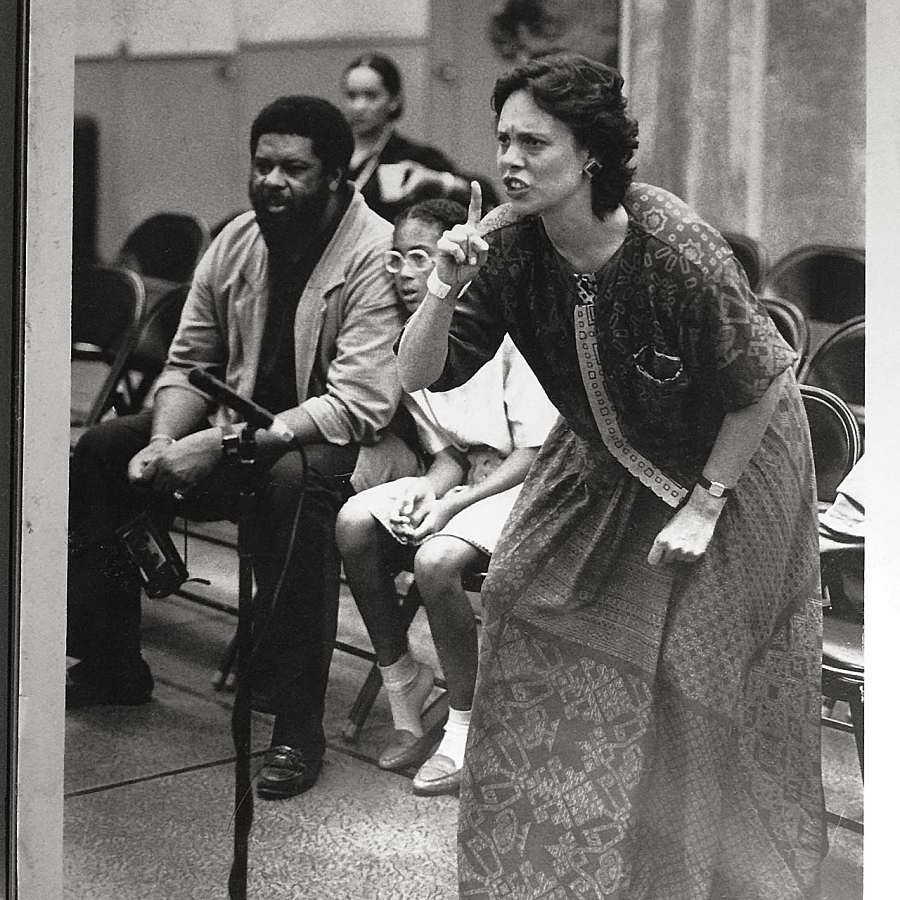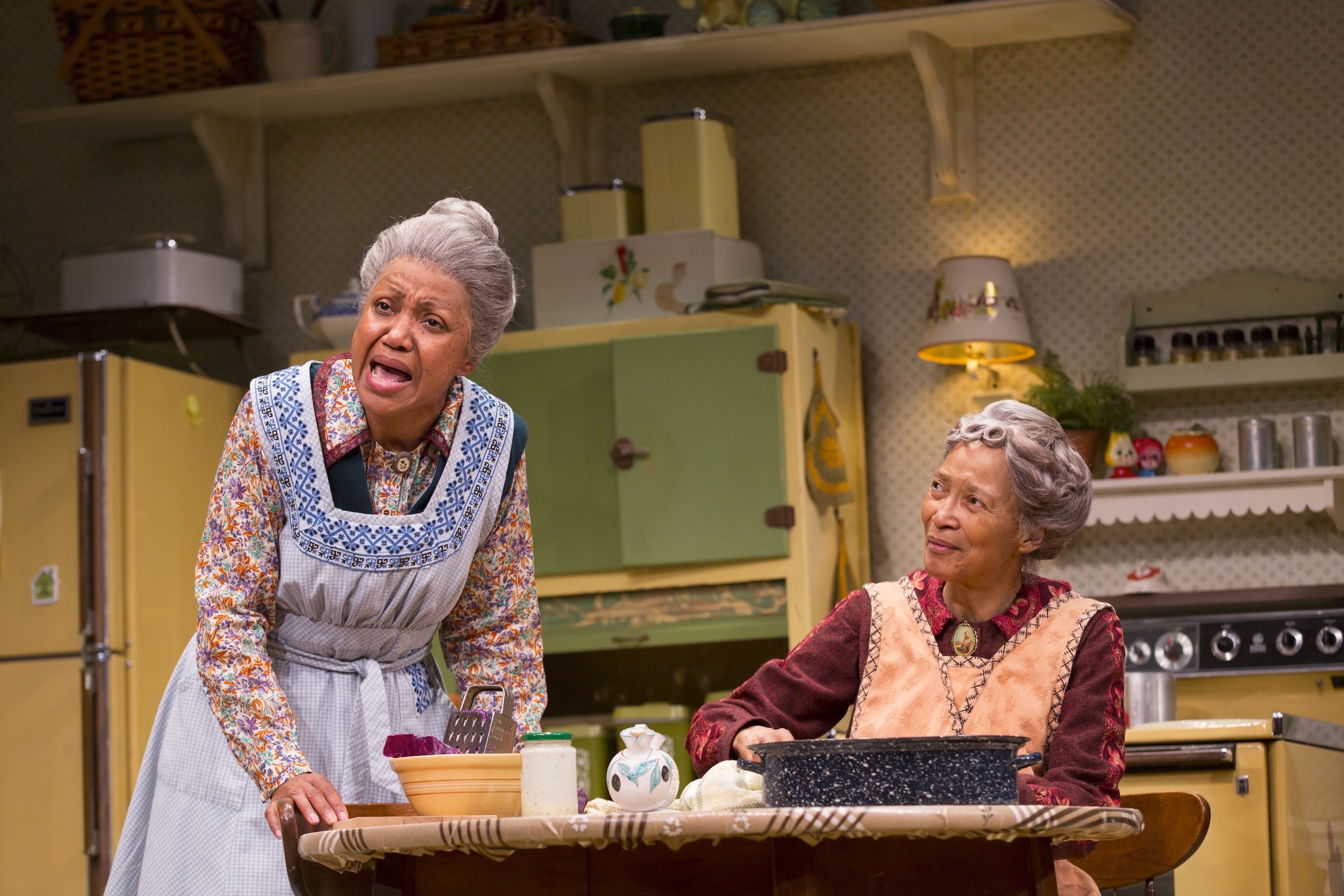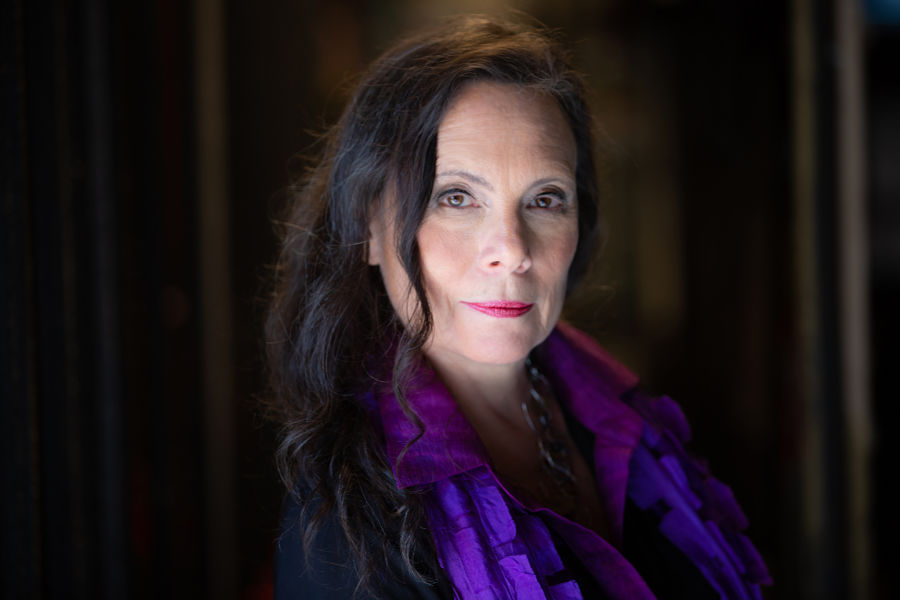There’s news, and then there’s big news. The surprise announcement last Friday that Emily Mann would plan one last season at New Jersey’s McCarter Theatre Center, then step down from the post in 2020, sent ripples through a theatre field already awash in a tidal wave of generational leadership change. For Mann didn’t just lead Princeton’s $23 million theatre from a respected regional outpost to a Tony-winning incubator of new work and new talent. While there she also built on an already ground-breaking career as a documentary-play creator and feminist director to create signature American works as Having Our Say: The Delany Sisters’ First 100 Years. Her stamp is on not only generations of theatre artists but creative administrators as well.
I spoke to Mann early yesterday about her legacy and her plans.
ROB WEINERT-KENDT: This is big news.
EMILY MANN: Big, scary news, yes. Huge, for me anyway.
And huge for the field. Does one say “congratulations” in this case?
Sure. It is kind of a congratulations. It was a huge decision, and it’s 30 years. It’s a whole life. And it’s hard to imagine life without McCarter for me, so I’m going through all of this along with everyone else. It’s so funny, people are saying, “Are you happy, are you sad, are you…” You know? It’s such a complex series of emotions. I just got mobbed coming down the hall by my staff; I got stomach flu last week, and though I was supposed to be able to meet with staff before the news hit on Friday, they’re just getting me now. There’s so much love and appreciation. And it’s still a year and a half to go, I tell everyone. So there’s plenty more work to do. Lots of partying too.
I wanted to ask, the press release used the word “retire”…
So wrong. I was so upset about that. Oh God!
So you’re leaving the McCarter, but this is not a retirement for Emily Mann.
Oh my dear, no. In the words of the great John Kani, who wrote me, “My dear, we elders in our industry never retire. We simply shift gears and become even more useful.” Which is exactly right. I am stepping down from McCarter so I can do more work. I’m letting go of the administration of the theatre, but I want to be able to be writing more, to be directing more, to be free to follow all kinds of new paths. I’m not even sure yet what opportunities are going to be coming my way, but I’m opening myself up to the universe to have it come to me for a little while.
I was at Gloria Steinem’s last night for a Gloria: A Life party at her house. And as always at a Gloria party, it turns into a talking circle. And the incredible embrace I got there, with all kinds of thoughts and ideas of what can come next and to be really brave about just opening the door and walking through and not having all the answers for once in my life—it’s very exciting to me.
I also have a lot of irons in the fire and some other reasons the pull was very strong. Right now I’m in a kind of new flowering of writing. I wrote two plays last summer, both Gloria: A Life and the adaptation of The Pianist for Robin de Levita, Kimiko Yoshii, and Michael Wolk for Broadway. So I’m in the midst of incredible creative activity, and I just want to start following those dreams for a while.
I just reread the story Alexis Greene wrote for us a few years ago about you, where she looks back at the time you were hired in 1990. And the conversations the board was having about hiring you—“Are we going to take a chance on a young woman who’s got an ‘agenda’ and stages controversial plays?”—sound a bit like the conversations we’re hearing about the prospect of “untested” new leaders taking over these theatres as your generation is leaving. I wonder how this moment looks to you.
Well, I think it’s very important at this moment to look at the role of boards very carefully. Some boards feel it’s up to them to decide on their vision and their mission, and then go out and look for an artist. Just as I think that’s the wrong way to write a play, I think it is the wrong way for an arts institution to think about what is best for it. What you want to do is find an extraordinary leader with vision and support that vision. So you are supporting the individual artistic vision. We’re not cookie-cutter theatres. And it should not be a volunteer board of extraordinary human beings who are stars in their own fields, often, but aren’t often artists or theatre people; what you want is someone to come in who has a fierce vision for their particular theatre, at this particular moment in time, who has their finger on the pulse of big movements.

I greatly admire—when I look back, I mean, I was 37 or 38 years old, and driven by this extraordinary fire, and the board responded to it and they took that great leap. It was tough at first; I inherited a theatre that was hemorrhaging money. But we all bonded together and banded together and came through that together, and went on to forge something that was strong for what will be 30 years.
At this moment I know there’s a group of young leaders, artistic leaders. They are artists and they are leaders, and that’s a very rare combination, and I hope these boards will be meeting with them and seeing if they can find the right fit. (It was so exciting to read about Melia Bensussen. She was my assistant at Hartford Stage, and now here she is leading it.) It’s quite an interesting passing of the torch or changing of the guard, however you want to look at it. As I say, I’m not retiring. I’m hoping to do more than ever. But in terms of running the theatre day to day, it’s definitely time for the next wave. It’s time for these exciting young artists to make their marks. It’s a hard to time to be—I mean, it’s always a hard time to be running a theatre.
I just heard you catch yourself saying “it’s so hard now,” because you know as well as anyone it’s always been hard.
It was never easy. But it’s quite tough right now.
It hasn’t gotten easier, that’s definitely true.
It definitely has not.
What are you most proud of in your decades at the McCarter?
Three things, and they’re related. One is all of the extraordinary new work we were able to commission, develop, nurture, and grow, much of which we produced and some of which we helped get produced elsewhere. It’s a diverse and extraordinary group of playwrights. I’m very, very proud of that. And of course, I was able to do my own work too—some of my biggest plays started here. And that’s of course close to my heart.
And then there’s mentorship. I always called them apprentices, but they are in fact interns or fellows. I look out at the industry now and I see how many extraordinary artistic directors, stage managers, marketing, every department—we have stars all over the country that started here. That fills me with enormous joy because that is a huge part of what I think of as my legacy. We take the training of young leaders, artists, and administrators very seriously here, and that has paid off enormously for the profession.
And then third is that we brought our education and engagement right into the center of the artistic staff. The work that we have done in our community has been an enormous source of gratification for me, and it’s been a great privilege to be able to make an impact on a huge level, both for young people and seniors, people who are in some ways afflicted by the ills of our world, whom we have brought hope and the power of the theatre, both in terms of seeing work but also in terms of creating it. The play I was just reading this weekend is written by some of the women of Homefront, an organization we’ve been working with for a very long time, for women who are homeless and often with children. We’ve just done incredible workshops with them where they’ve come out of depression and terror and are making theatre with their children. The power of creativity is sometimes a life saver. And that’s been a great part of this journey.
I was going to ask about your relationship with New Jersey and with Princeton, which is a college town. It seems like that’s been a mission from the start, to have your work reflect all the areas around the McCarter, not just Princeton.
We brought Trenton to Princeton. And New Brunswick, and places all over the state—suburban, exurban, rural, and city. We reached out and made an impact.
We all sort of know the founding story of the American theatre, how the regional theatre movement was born in the 1960s. And then folks like you and Carey Perloff and Tony Taccone took over from the founding generation in the 1980s and 1990s. And now many of you are passing the torch. Looking back, what has been the story of last 30 or so years? The first generation’s stories are legends, what’s the story…
Of the second wave? I think it has a lot to do with the things that I was talking about. We worked very hard to bring women and people of color onto the mainstages and into the story of America by telling the stories on our stages. For me, it was a mission from the moment I hit the ground in Princeton. When we opened the first season with Betsey Brown, a musical I wrote with Ntozake Shange and Baikida Carroll, there hadn’t been the work of any person of color on the stage yet. I was stunned. But it was 1991. There was a lot of work to be done, and that meant opening up who the audience was. I think I’m not alone in having done that. And so women and non-European or non-white people—that was my mission from the moment I arrived, and I think it probably was too for many of my colleagues at the same time. Not all, believe me. But some of us, we were comrades in arms.

So that’s a huge change. I think also the idea of reaching out into community was something personally very important to me because of my activist side. I think that was more true of many of us than our predecessors. I would think those are the two big marks that we made, and there’s a lot of work still left to do on all of this. But we did break down some barriers.
You’re going to plan one final season, titled “Signature Emily.” Can you give any teasers yet?
It will be very much like any of my best seasons. It will have new work and commissioned work. Women and people of color are well-represented. I will be as well. It’s not as if I’ll be reprising Emily’s greatest hits; I decided that is not the way I want to go out. It’s all very forward-looking. But each one signifies something important in what I believe in in terms of what the American theatre should be all about and what the McCarter’s been all about.
There will be some documentary plays, I imagine, right? I don’t know if you like that term.
I do, actually. I guess I can’t leak it—I would love to be able to tell you the season. I’m just sort of biting my tongue because I think I’m not supposed to.
I’m looking forward to it, and to your next chapter.
Do please highlight that I am not retiring.
Yes, I will.
Quite the opposite. I’m going to be doing more.


